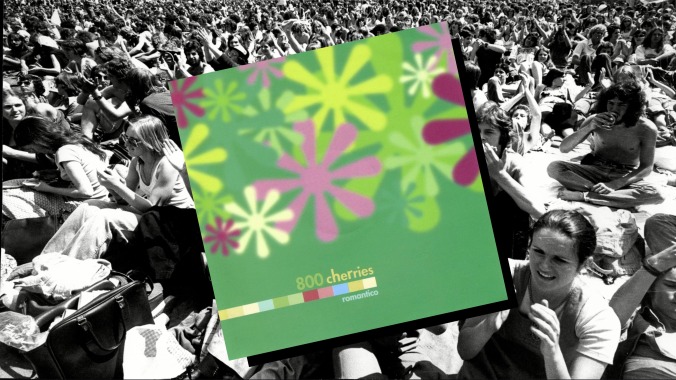Time Capsule: 800 cherries, romantico
Every Saturday, Paste will be revisiting albums that came out before the magazine was founded in July 2002 and assessing its current cultural relevance. This week, we’re looking at Tokyo duo 800 cherries’ monumental and underrated sophomore album—a Shibuya-kei classic released in 1998 with soundscapes so timeless they’ve caught on with American audiences in recent years.

800 cherries are a duo that have been largely shrouded in mystery. Hailing from Tokyo, the band consists of Manami Marufuji (vocals, guitar, keyboard) and Masayuki Takahashi (guitar, bass, keyboard), and virtually no information about them or their creative process exists online—other than that a third member, Ritsuko Ôtera, had joined the group in 1994 but left by 1997. Their music nestles nicely within the pop microgenre of Shibuya-kei, which primarily circulated in Japanese hipster communities throughout the ‘90s—the genre arrived as a blend of mainstream J-pop, jazz and seminal, pioneering Wall-of-Sound artists from three decades prior, like Phil Spector and Brian Wilson.
romantico, 800 cherries’ second album, miraculously crossed over to an American audience in the last handful of years—seemingly due to both favorability in Spotify’s algorithm, its discoverability in more independent sectors and spaces like NTS Radio and the fact that the record is sung entirely in English—after being released over 25 years ago. (As of writing, the highest concentration of 800 cherries’ Spotify listeners are in Los Angeles, Brooklyn and Chicago.) romantico’s lyrics are always fairly straightforward, allowing the listener to be able to fully bask in the ditsy, lo-fi soundscapes Marufuji and Takahashi bring to life across the record’s concise 35-minute runtime.
Opener “painty paint pots” is an all-encompassing introduction to the charm and appeal of 800 cherries as a unit. While the instrumentation is inherently fairly minimal—with just synths, keyboards, vocals and intermittent electric guitar interjections—the duo knows how to use their space effectively. The chord progression is reminiscent of several jazz standards, particularly the Dave Brubeck Quartet’s “Take Five.” Syncopated keys underscore Marufuji’s youthful, whimsical voice as she sings, “Paint my floor green but don’t forget flowers / Paint my floor green but don’t forget bashful moles / Paint my floor green, but don’t forget pop mushrooms.” Whether these lyrics have some deeper philosophical meaning is unclear, but that ambiguity doesn’t take away from the song whatsoever.
This sound is fairly consistent throughout romantico, and even on instrumental chapters like the title track and “planc-tone,” substance and creativity is not lost. “romantico” is contemplative and passively immersive—woodblock and chimes drenched in reverb, a quaint Wurlitzer and bright acoustic guitar is all you hear throughout its brief 83 second runtime, making me wonder why nobody at Nintendo thought to offer the duo a gig composing the Animal Crossing soundtracks.
Twee bliss courses through the veins of romantico, especially on songs like “rainy poppy field” and “la pa ti ta,” that are uncompromising in the joy they set out to exude in spite of their somewhat melancholic lyrics. “rainy poppy field” sees Marufuji being forced to leave someone behind to protect her peace, as she sings “You make me blue / I have to say to you goodbye” atop cheery, polka-like keyboards and a warm vibraphone countermelody. That being said, I do think some of romantico suffers from the extent of its cohesiveness. Too much sugar is going to make your tummy hurt, and while these songs are an absolute delight to listen to in chunks, the full record sometimes leaves some variety to be desired. But if an album that sounds like one organic movement broken up by track numbers is your thing, then romantico will satiate your appetite.
The exception to that rule is “honeydew blue,” a track that fully leans into the melancholia of its subject matter. The production takes on Spector’s Wall of Sound approach, stacking layers of synths and guitars, over a drizzle of impressively crisp snare and intermittent bird sounds. Marufuji addresses an ex lover: “Why did you sometimes feel unhappy? / Why did you sometimes feel so lonely?”; the soundscape, paired with sparse, depressing lyrics, makes for a kitschy, shoegaze-infused J-pop song.
The closing track is a gorgeous cover of the Velvet Underground’s “Here She Comes Now.” 800 cherries apply their keyboard-oriented sound to the song, providing a version a lot airer than the original. Marufiji’s vocals really shine by the record’s conclusion—not only is she far more present in the mix, but the vocal harmonies are dense and beyond gorgeous. The beauty of romantico doesn’t lie in its complexity, but rather in what it is able to do with so very little. If anything, the confounding lack of information that exists about this record and 800 cherries as a band makes the listening experience more intriguing. With each revisit, more of the curtain gets pulled back.